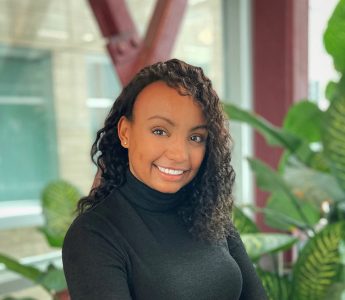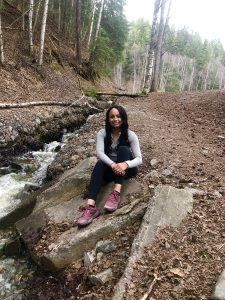How one Doctors of BC Presidential Scholar is striving for health equity in rural B.C.

Kimberley Thomas
After Kimberley Thomas relocated with her family to Calgary, Alberta from Bulawayo, Zimbabwe when she was a young child, her parents worked multiple jobs with the hope of one day supporting their three daughters through university.
Then, decades later, Thomas’ life changed in a moment. With one telephone call, not only did she find out she had been accepted to the UBC Faculty of Medicine’s MD Undergraduate Program, but also that she had received the Doctors of BC Presidential Scholars Award in Medicine.
“A huge burden was taken off our family, and for the first time, I felt like we could breathe. The award means so much. It means that people with backgrounds like mine can have a seat at the table in medicine,” says Thomas. “I think of my little cousins wanting to go to university because now they can see themselves as doctors. The generosity I experienced inspires me to bring it to others, especially those in northern rural communities.”
Now in her second year of the UBC Northern Medical Program based in Prince George, B.C., Thomas brings a breadth of experience in health equity, creative arts and palliative care to her medical training.

During her undergraduate studies, she volunteered with a health and family support society in downtown Calgary and at a hospice in rural Alberta, where she recalls a deeply emotional connection with a patient.
“There was a gentleman at the hospice who had no visitors,” she says. “I would spend a lot of time with him. We would go walking outside and look at paintings together. It was our favourite thing to do.”
The patient’s daughter lived far away in northern Alberta and found it hard to visit her father.
“It just broke my heart,” says Thomas. “I spent a lot of time with him, but none of his loved ones could be there with him at the end of his life.”
This experience inspired Thomas to complete a Master’s degree in health sciences focused on how to make palliative care community-based, so these patients can be surrounded by loved ones, family and friends.
She also worked on projects that used creative space to address health disparities. In one remote community west of Prince George, she observed the entire community—from infants to elders—doing an art project together. The local family physician joined in, and people reflected through their art about what health and wellbeing means to them.
“Art grounds people and brings them to the same level,” Thomas says. “I feel as though it removes power differentials and creates an amazing opportunity to connect people. There was this humanness and partnership in bringing everyone together. We know science heals, but there is true potential for healing through art.”
When Thomas becomes a doctor, she wants to be connected to patients and know their stories, while also working at a public health and policy level.
“We’re experiencing a cultural change in how we approach end-of-life care, and as our population is aging, we know that most people want to stay close to home,” says Thomas. “I feel that in my future career, I might have the ability to help make that an option for everyone.”